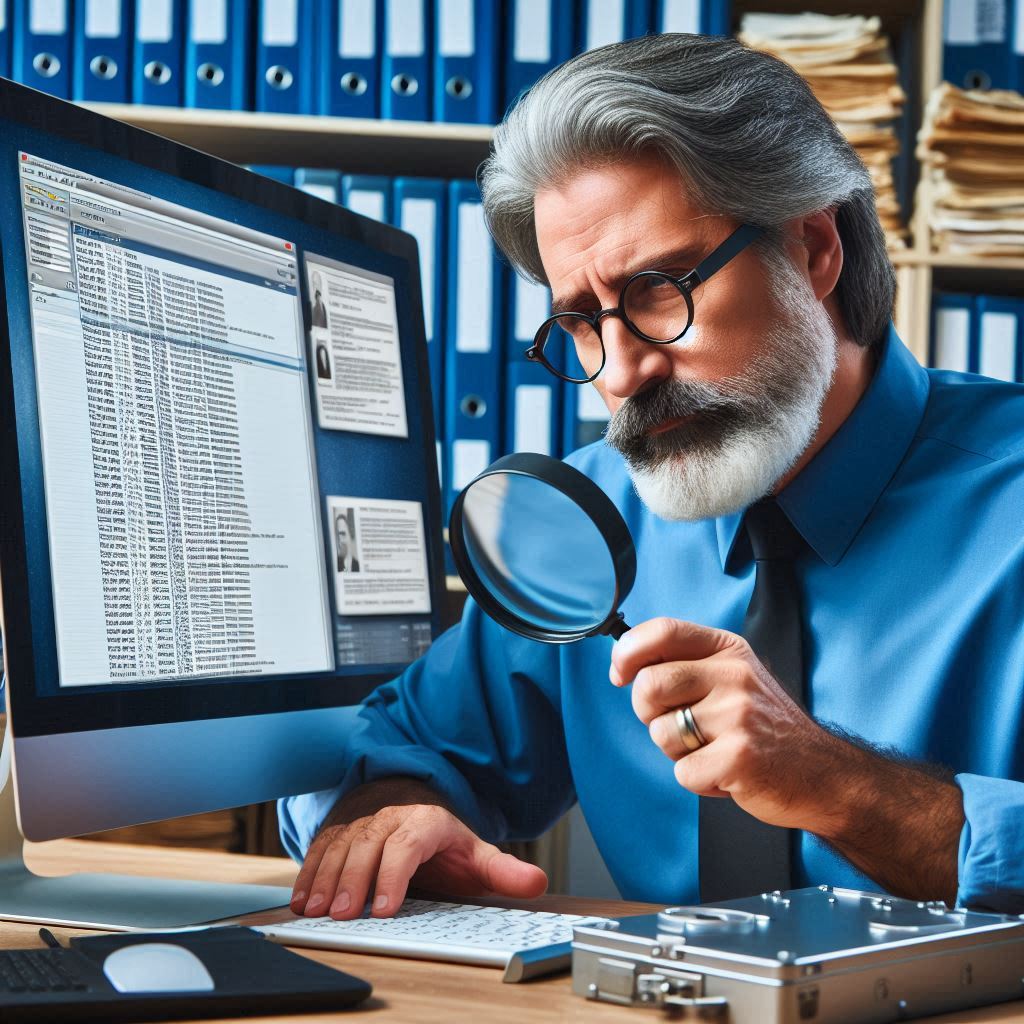Introduction
The field of e-discovery is growing rapidly, creating increasing demand for specialists in the legal industry.
As digital information becomes more integral to legal cases, the role of e-discovery specialists has become essential.
These professionals manage electronic evidence for court cases and investigations, ensuring that digital data is handled correctly and efficiently.
E-discovery specialists are responsible for identifying, collecting, and preserving electronic data.
They ensure that the data remains intact and unaltered throughout the legal process.
This is crucial for maintaining the integrity and admissibility of evidence in court.
Their expertise allows legal teams to focus on case strategy while knowing the digital evidence is in capable hands.
The importance of e-discovery specialists has grown with the increasing volume of electronic data in legal cases.
They help legal teams navigate the complexities of handling and presenting digital evidence.
Their skills are critical in managing vast amounts of electronic information, from emails and documents to social media and cloud storage.
E-discovery specialists play a pivotal role in ensuring compliance with legal standards and regulations.
They understand the legal requirements for collecting and processing electronic data, which is vital for maintaining the evidence’s admissibility.
Their knowledge helps prevent potential legal challenges and ensures that evidence is presented effectively in court.
Understanding the Role of an E-Discovery Specialist
Responsibilities of an E-Discovery Specialist
An e-discovery specialist plays a crucial role in managing electronic evidence for legal cases.
Their primary responsibilities include identifying, collecting, processing, and reviewing electronic data.
Identifying Electronic Data
E-discovery specialists start by identifying sources of electronic data relevant to the case.
They analyze various data repositories, including emails, social media, and cloud storage.
This involves working closely with legal teams to understand the data needs and scope of the case.
Specialists use specialized tools to locate and catalog potential sources of data.
Collecting Electronic Data
Once relevant data sources are identified, specialists collect the data using forensic techniques.
They ensure that data collection methods are legally defensible and preserve the evidence‘s integrity.
Collecting data involves creating exact copies of digital information without altering or damaging it.
Specialists follow strict protocols to ensure the data is securely stored and protected from unauthorized access.
Processing Electronic Data
After collection, specialists process the electronic data for review.
This involves filtering and organizing the data to make it manageable and relevant for legal review.
They use various tools to index and categorize the data, making it easier to search and retrieve.
Processing ensures that data is organized in a way that supports the legal team‘s case strategy.
Reviewing Electronic Data
The review phase involves analyzing the processed data to identify key pieces of evidence.
Specialists search for relevant documents and communications that support or refute legal arguments.
They work closely with attorneys to provide insights and recommendations based on their findings.
The review process is critical for building a strong case and preparing for court proceedings.
Maintaining Data Integrity
Maintaining data integrity is essential in e-discovery.
Specialists use hashing algorithms to verify that data remains unaltered during collection and processing.
They document every step of the data handling process to provide an audit trail.
This documentation ensures that the data‘s integrity is preserved, making it reliable and admissible in court.
Ensuring Compliance with Legal Regulations
E-discovery specialists must ensure compliance with legal regulations governing electronic evidence.
They stay updated on laws and regulations related to data privacy and protection.
Compliance involves following established protocols for data handling and processing.
Specialists must also ensure that their practices adhere to legal standards, minimizing the risk of evidence being challenged in court.
In summary, e-discovery specialists are responsible for identifying, collecting, processing, and reviewing electronic data.
They must maintain data integrity and ensure compliance with legal regulations.
Their role is vital in managing electronic evidence effectively, supporting the legal team, and ensuring that evidence is accurately presented in legal proceedings.
Read: Patent Attorney Work Environments: In-House vs. Law Firms
Gain relevant education and skills
Educational Requirements for Becoming an E-Discovery Specialist
Becoming an e-discovery specialist typically requires a solid educational foundation.
Many specialists start with a degree in computer science, information technology, or a related field.
These degrees provide essential knowledge of computer systems, networks, and data management.
Understanding these fundamentals is crucial for handling electronic evidence effectively.
Some professionals may also pursue degrees in legal studies or forensic science.
These fields offer insight into the legal aspects of evidence handling and compliance.
Combining technical and legal education prepares you for the diverse challenges in e-discovery.
A well-rounded educational background enhances your ability to manage complex data and understand legal requirements.
Importance of Gaining Technical Skills in Data Analytics
Technical skills are crucial for a successful career in e-discovery.
Data analytics is one key area that specialists must master.
Proficiency in data analytics enables you to process and analyze large volumes of electronic information.
This skill helps in identifying relevant data and drawing accurate conclusions.
Database Management Skills
Another essential technical skill is database management.
E-discovery specialists often work with large databases containing evidence and case-related information.
Understanding database structures, queries, and data retrieval methods is vital for efficiently managing and extracting data.
Strong database management skills ensure that you can handle and organize information effectively.
Proficiency in E-Discovery Software
E-discovery software proficiency is also critical. Various software tools help in the collection, processing, and analysis of electronic evidence.
Learning to use these tools effectively improves your efficiency and accuracy in handling e-discovery tasks.
Familiarity with popular e-discovery platforms, such as Relativity, Nuix, or FTK, can make you a more competitive candidate.
Combining Education with Technical Skills
Combining your educational background with technical skills prepares you for the diverse responsibilities of an e-discovery specialist.
The ability to understand and implement technical solutions is essential for managing electronic evidence and supporting legal teams.
Regularly updating your technical skills and knowledge ensures you remain effective and competitive in the field.
Basically, becoming an e-discovery specialist involves specific educational and technical requirements.
A degree in computer science, information technology, or a related field lays the foundation.
Developing technical skills in data analytics, database management, and e-discovery software is equally important.
These skills enable you to handle complex data and support legal processes effectively.
Investing in your education and technical proficiency will position you for success in the e-discovery field.
Embrace these requirements to build a strong and rewarding career as an e-discovery specialist.
Read: How to Choose the Right Patent Attorney for Your Needs
Obtain certifications
Different certifications available for e-discovery specialists
Certifications play a crucial role in establishing credibility as an e-discovery specialist.
Several certifications can significantly enhance your qualifications in this field.
Two prominent examples are the Certified E-Discovery Specialist (CEDS) and the Relativity Certified Administrator (RCA).
The CEDS certification is offered by the Association of Certified E-Discovery Specialists (ACEDS).
This certification covers a broad range of e-discovery topics, including processes, technology, and legal issues.
It demonstrates your expertise in managing e-discovery projects and adhering to industry best practices.
Transform Your Career Today
Unlock a personalized career strategy that drives real results. Get tailored advice and a roadmap designed just for you.
Start NowThe RCA certification, provided by Relativity, focuses on mastering the Relativity platform.
This certification is ideal if you work extensively with Relativity software.
It validates your ability to manage, administer, and troubleshoot the platform efficiently.
Both certifications require passing an exam. For the CEDS, you need to complete a comprehensive exam that tests your knowledge across various e-discovery areas.
The RCA exam evaluates your proficiency in using Relativity‘s software features.
Benefits of obtaining these certifications in terms of credibility and job opportunities
Obtaining certifications like CEDS or RCA can significantly enhance your professional credibility.
These credentials signal to employers and clients that you possess advanced knowledge and skills.
They provide evidence of your commitment to the e-discovery field and your dedication to maintaining high standards.
Certifications also open doors to new job opportunities.
Many organizations prefer or even require specific certifications for e-discovery roles.
Having these credentials on your resume can make you a more attractive candidate.
It can set you apart from others who lack formal qualifications.
Furthermore, certifications can lead to career advancement.
They often qualify you for higher-level positions and responsibilities.
As organizations recognize your certified expertise, they may offer more challenging and rewarding roles.
In addition to job opportunities, certifications can lead to higher earning potential.
Certified professionals often command higher salaries than their non-certified counterparts.
This is because certifications demonstrate specialized knowledge and a commitment to the profession.
Certifications also provide networking opportunities.
Being certified can connect you with other professionals and industry experts.
It can open doors to exclusive industry events, forums, and groups where you can exchange ideas and expand your professional network.
Gain practical experience
When it comes to becoming an e-discovery specialist, gaining practical experience is crucial.
Here are some ways to achieve this
Internships
One of the best ways to gain practical experience in e-discovery is through internships.
Seek out opportunities at law firms, e-discovery consulting firms, or even in-house legal departments.
Volunteer work
Consider volunteering your time and skills to gain hands-on experience in e-discovery.
Look for pro bono opportunities or volunteer positions that focus on e-discovery projects.
Part-time positions
Another option is to take on part-time positions at law firms or e-discovery consulting firms.
This can provide you with valuable experience and exposure to real-world e-discovery processes.
Importance of hands-on experience
Working directly with e-discovery tools and processes is essential for developing a deep understanding of the field.
Here are some reasons why hands-on experience is crucial
- Gain practical skills: Hands-on experience allows you to develop practical skills that are essential for working in e-discovery.
- Real-world exposure: Working with e-discovery tools in a real-world setting gives you exposure to the challenges and complexities of the field.
- Build industry knowledge: Hands-on experience helps you build a strong foundation of knowledge about e-discovery processes and best practices.
- Networking opportunities: By gaining practical experience, you also have the chance to network with professionals in the e-discovery industry, which can lead to future job opportunities.
Overall, gaining practical experience is a key step in becoming an e-discovery specialist.
Whether through internships, volunteer work, or part-time positions, getting hands-on experience will set you apart in this competitive field.
Read: How Patent Agents Assist in Protecting Your Inventions

Learn More: Legal Nurse Consulting: Legal Case Preparation
Network within the industry
Join Professional Organizations like The Association of Certified E-Discovery Specialists (ACEDS)
Joining professional organizations is a crucial step in becoming an e-discovery specialist.
The Association of Certified E-Discovery Specialists (ACEDS) is one such organization.
ACEDS offers resources and support for e-discovery professionals at all career stages.
By joining ACEDS, you gain access to a network of industry experts and peers.
Networking with other professionals helps you learn best practices and new techniques.
ACEDS also provides certification programs that enhance your credibility in the field.
Earning a certification from ACEDS shows your commitment to professional development.
It validates your knowledge and skills in e-discovery.
Many employers look for candidates with recognized certifications, making it easier to advance in your career.
Joining ACEDS can also provide mentorship opportunities.
Experienced members can guide you and offer advice on navigating your career path.
Attend Industry Conferences, Webinars, and Networking Events
Attending industry conferences, webinars, and networking events is vital for staying updated on trends and job opportunities.
These events offer a platform to learn about the latest developments in e-discovery.
Conferences often feature presentations by leading experts in the field.
These sessions provide insights into new technologies, tools, and best practices.
Webinars offer convenient, online learning opportunities.
They allow you to gain knowledge without needing to travel.
Networking events are invaluable for building professional relationships.
Meeting other professionals in person helps establish connections that can lead to job opportunities.
These events often include workshops and panel discussions.
Participating in these activities enhances your understanding of the industry.
You can also discuss challenges and solutions with peers facing similar issues.
Showcase Your Business Today
Reach thousands of readers actively exploring professional services. Publish your business profile and grow your audience now.
Publish NowIndustry events also provide opportunities for continuing education.
Staying informed about new regulations and advancements is crucial in e-discovery.
Continuous learning ensures you remain competitive in the job market.
Attending these events demonstrates your dedication to staying current in your field.
Employers value professionals who actively seek to improve their skills and knowledge.
Benefits of Networking
Networking with other e-discovery professionals offers numerous benefits.
It helps you build a support system within the industry.
You can share experiences and advice with your peers.
Networking also opens doors to potential job opportunities.
Many positions are filled through recommendations and referrals from within professional networks.
Engaging with other professionals can lead to collaborative projects and partnerships.
Networking helps you gain different perspectives on common challenges.
Discussing issues with others can lead to innovative solutions.
Building a robust professional network also enhances your reputation in the field.
It shows you are an active member of the e-discovery community.
Networking also provides access to exclusive resources and information.
Many professional organizations and industry groups share job postings, research, and news with their members.
Joining professional organizations like ACEDS and attending industry events are crucial steps in becoming an e-discovery specialist.
These activities help you network with other professionals, stay updated on trends, and find job opportunities.
Engage in continuous learning and networking to advance your career in e-discovery.
Embrace these opportunities to grow and excel in this dynamic field.
Read: Typical Salary Range for Patent Agents in America
Stay updated on industry trends
Staying informed about the latest developments in e-discovery technology
E-discovery is a rapidly evolving field, making it crucial to stay updated with the latest developments.
Technology, regulations, and best practices change frequently.
To remain competitive, you must embrace continuous learning and professional development.
The first step is to follow online resources dedicated to e-discovery.
Websites like eDiscovery Today and ACEDS offer valuable insights.
These platforms provide updates on the latest tools, technologies, and trends in the industry.
Regularly reading their content can help you stay informed.
Blogs are another excellent resource for staying current.
Many industry experts share their knowledge and experiences through blogs.
Subscribing to these blogs ensures you receive timely updates and expert advice.
Popular blogs include The Relativity Blog and Above the Law’s e-discovery section.
Industry publications are equally important.
Journals such as the Journal of Digital Forensics, Security, and Law publish in-depth articles on the latest research and developments.
Reading these publications can deepen your understanding of complex topics and emerging trends.
Participating in webinars and online courses is also beneficial.
Many organizations offer free or low-cost webinars on various e-discovery topics.
These sessions provide opportunities to learn from experts and ask questions in real-time.
Platforms like Coursera and edX offer courses on related subjects, often taught by industry leaders.
Joining professional associations can provide additional learning opportunities.
Organizations like the Association of Certified E-Discovery Specialists (ACEDS) offer certifications, training, and networking events.
Being part of such associations helps you stay connected with peers and experts in the field.
Importance of continuous learning and professional development
Continuous learning is not just about staying informed; it‘s about skill enhancement.
As new technologies emerge, mastering them can set you apart from others.
Take advantage of training programs offered by software vendors.
Many companies provide certification courses for their tools, which can boost your credibility.
Professional development is essential for long-term success in e-discovery.
Regularly updating your skills ensures you remain relevant and valuable to employers.
It also opens up new career opportunities and paths for advancement.
Most importantly, staying informed and continuously learning are critical for success in e-discovery.
By leveraging online resources, industry publications, webinars, and networking opportunities, you can enhance your skills and stay competitive.
Embrace the ever-evolving nature of the field, and commit to ongoing professional development.
Learn More: How Immigration Consultants Help with Visa Denials
Discover More: Building a Successful Trademark Law Practice: Tips
Conclusion
Becoming an e-discovery specialist involves several key steps that are essential for success in this dynamic field.
First and foremost, understanding the role and its responsibilities is crucial.
An e-discovery specialist manages electronic data for legal cases, ensuring evidence is accurately collected, preserved, and analyzed.
This role requires a deep understanding of both legal and technical aspects.
Gaining relevant education and certifications is the next important step.
Many e-discovery specialists start with a degree in information technology, law, or a related field.
Specialized certifications, such as those offered by the Association of Certified E-Discovery Specialists (ACEDS), can enhance your credibility and knowledge.
These certifications demonstrate your commitment to the field and provide you with up-to-date industry knowledge.
Practical experience is invaluable for aspiring e-discovery specialists.
Internships or entry-level positions in law firms, corporate legal departments, or consulting firms provide hands-on experience.
Working on real cases helps you understand the practical application of your skills and knowledge.
It also allows you to build a portfolio of work that can impress potential employers.
[E-Books for Sale]
The Big Book of 500 High-Paying Jobs in America: Unlock Your Earning Potential
$19.99 • 500 High-Paying Jobs • 330 pages
Explore 500 high-paying jobs in America and learn how to boost your career, earn more, and achieve success!
See All 500 High-Paying Jobs of this E-Book
1001 Professions Without a Degree: High-Paying American Jobs You Can Start Now
$19.99 • 1001 Professions Without a Degree • 174 pages
Discover 1001 high-paying jobs without a degree! Unlock career tips, skills, and success strategies for just $19.99!




